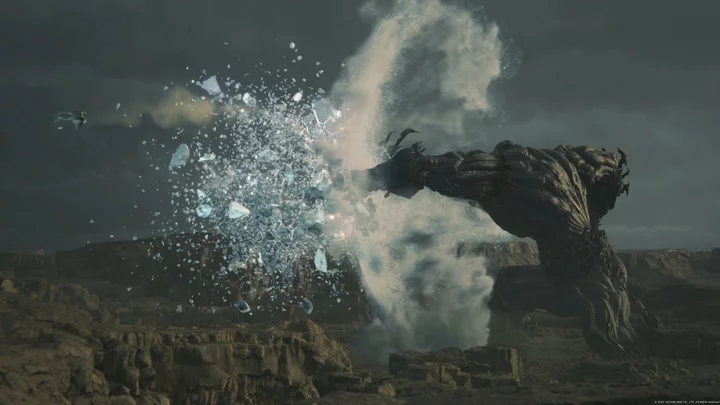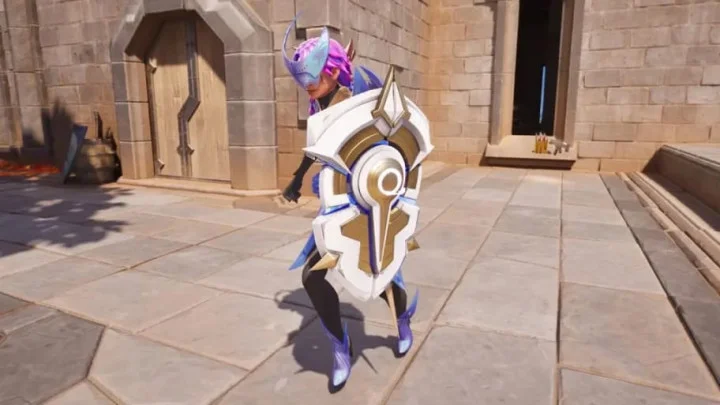The Final Fantasy franchise has been an RPG paragon for more than 30 years. Although the original NES title clearly riffed on Dragon Quest and Dungeons and Dragons, the series evolved into its own iconic brand with a recurring pantheon of gods, monsters, and thematic elements. The upcoming Final Fantasy XVI embraces that storied legacy, while aging up the franchise for an older audience. This iteration moves beyond the series' Teen rating, depicting a cruel world not unlike HBO’s Game of Thrones. It’s a first for the franchise, but if the demo is any indication, Square Enix set up a terrific teaser for what’s to come when the PlayStation 5 game launches on June 22.
A Cold, Dark World
Final Fantasy XVI is set in Valisthea, a magic-fueled realm divided between six nations. Massive landmarks called Mothercrystals provide the world with the magical power its denizens need to comfortably live, and this resource is fought over in various skirmishes. What’s more, magic users are branded, and strictly controlled or outright enslaved to serve the needs of the people.
Powerful demigods, Eikons, serve these nations as living weapons of mass destruction, and they're based on the classic summoned monsters in the Final Fantasy mythos. These Eikons are contained within Dominants, people who house the demigods' power and spirit. It's in this turbulent world that you meet Clive Rosfield, a young, branded prince who is desperate for revenge.
Final Fantasy XVI's opening hours reveal the events leading up to Clive’s fall as prince and eventual enslavement. We won’t go into spoilers. Suffice it to say, the cinematic storytelling is surprisingly engrossing, and the demo’s cliffhanger ending is a brilliant segue into the main game. The dialogue and voice acting are overall excellent, and the musical compositions are a perfect complement to the prologue's emotional rollercoaster.
The mood and language are decidedly darker and grittier than any game in the series to date, with swearing and suggestive themes that make the obscenities uttered in Final Fantasy VII seem like playground banter. Although Final Fantasy XVI is more vulgar, it never feels inappropriate given the context. The game earns its Mature rating, but it's not edginess for edginess’ sake; the language and themes feel appropriate for the story.
Want more news, reviews, gear, and tricks to level up your game? Sign up for our gaming email newsletter.
Final Fantasy XVI Embraces Action
The Final Fantasy franchise has straddled the line between turn-based and real-time action since its jump to the Super Nintendo. The Active Time Battle system gave the turn-based combat an energizing sense of urgency by giving party members their own action gauge. This let them act when the gauge was filled. Later games, such as Final Fantasy X-2 and Final Fantasy XIII, were essentially action games with ATB-styled stamina bars. The combat felt as fast-paced and frantic as any action title.
With Final Fantasy XVI, the developers dropped all pretexts and designed the combat from the ground up with a melee-action framework. Tapping the attack button initiates an immediate melee attack, tapping the magic button instantly unleashes an elemental projectile, and tapping the dodge button lets you evade an assailant’s blows. This is run-of-the-mill action game fare, but it's new territory for a mainline Final Fantasy title. You play Final Fantasy XVI like Bayonetta or Devil May Cry.
Larger enemies have a Will gauge that steadily depletes as they are attacked. Land enough hits on a big bruiser and they stagger, falling to their knees for a few seconds and taking bonus damage. You also have a Limit gauge that Clive builds as he attacks enemies. When the gauge is filled, he enters a powered-up state that enhances his attacks and accelerates healing. Think Devil Trigger or Spartan Rage in Devil May Cry and God of War, respectively.
Of course, there are combat nuances that make it distinct from those games. Clive performs special attacks fueled by the Eikonic demigods. These are extremely powerful strikes with unique effects and functions in battle. Phoenix is Clive’s default power, and it features a well-rounded move set. It lets Clive perform heavy blows and crowd-control attacks, and gives him a snappy teleporting movement ability to close the gap between him and a target. Garuda gives Clive frantic multi-hitting combo attacks, and a grappling attack to pull targets toward him. Garuda’s moves also deal excellent stagger damage, making them ideal for stunning foes. Titan gives Clive a dedicated block and parry, as well as beefy charged attacks that outright kill most basic enemies. Titan’s attacks greatly boost the Limit gauge.
In addition, there are many nuances in Clive’s own attacks. For instance, Clive performs a unique finisher when attacking prone enemies with a basic attack. Likewise, you can chain a magical blast to each of Clive’s melee swings, giving you a timing-based buff to increase the onslaught (a la Nero from Devil May Cry 5). Phoenix’s Heatwave attack, which launches magical blades, receives a power boost if you use it to counter incoming projectiles.
A Few Issues
Unfortunately, there's no way to customize the controls outside of pre-made sets. I would much prefer mapping the projectile button to a gamepad's shoulder button, but choosing one of the alternate controls radically changes too many of the other buttons. I hope this feature is added when the game goes live.
The Eikon-swapping issue is a little more involved. You have access to three Eikon move sets at any given time, but must cycle between them by tapping the L2 button. This is similar to Devil May Cry's style switching. Clive’s core moves remain the same, but you must frequently shuffle the Eikon abilities to efficiently fight. This is made worse by the fact that Eikon actions have their own cooldowns, so you must carefully manage which moves are available and which are not. It simply feels clunky.
The game offers performance and cinematic display options, too. The former optimizes the frame rate, while the latter focuses on enhanced graphics. When playing in performance, the frame rate fluctuated between 30fps and 60fps depending on the environment and situation. The performance was fairly consistent during combat, but exploration saw the greatest frame rate fluctuation.
Otherwise, the game performed excellently; no crashes, loading hiccups, or bugs. It may seem like a mundane thing to praise, but it's significant given the quality of some major 2023 video game releases.
Why You Should Game on a PCFinal Fantasy Grows Up
Final Fantasy XVI is poised to deliver an impressive action experience in a few weeks. The combat is challenging, and the story beats are gripping and shocking. If you’re a Final Fantasy fan, or just curious about buying a new action-RPG title, give the demo a spin.
Final Fantasy XVI launches June 22, exclusively on PlayStation 5. A PC version is in the works, but it lacks a release date. In fact, we probably won’t see it until next year, at the earliest.
Want in-depth video game discussion? Visit PCMag's Pop-Off YouTube Channel. If Steam is your PC platform of choice, point your browser toward PCMag's Steam Curator group for video game recommendations.









